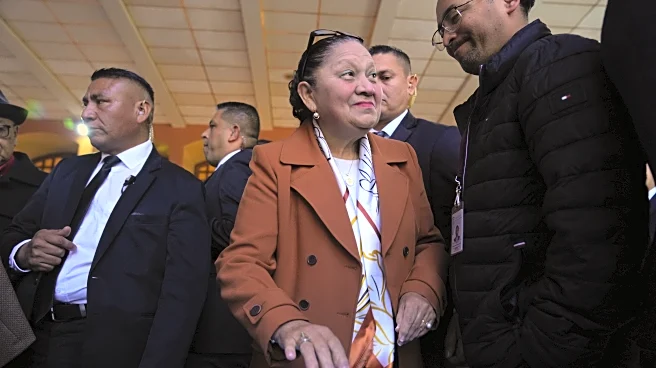What is the story about?
What's Happening?
President Donald Trump has announced new tariffs on imported goods, including softwood lumber, upholstered furniture, and kitchen cabinets and vanities. The tariffs are part of Trump's broader strategy to boost domestic manufacturing by imposing substantial tariffs on countries that do not produce furniture in the United States. The new tariffs include a 10% global tariff on softwood lumber and a 25% tariff on certain upholstered furniture, which will increase to 30% on January 1, 2026. Kitchen cabinets and vanities will face a 25% tariff, rising to 50% on January 1. While the U.K., EU, and Japan will receive lower preferential rates due to trade deals with the Trump administration, China has reacted negatively, with a spokesperson from the Chinese Foreign Ministry stating that "there are no winners in tariff or trade wars, and protectionism leads nowhere."
Why It's Important?
The imposition of these tariffs is significant as it reflects President Trump's continued focus on reshaping trade policies to favor American manufacturing. While tariffs can protect domestic industries by reducing foreign competition, they also have the potential to increase consumer prices and contribute to inflation. The Federal Reserve has expressed concern that these tariffs could exacerbate inflation, which is already elevated in the U.S. This economic strategy could have political implications for Trump, especially with the upcoming 2026 midterm elections, as high living costs and a weak job market could pose challenges to his administration.
What's Next?
The tariffs are set to increase further in January 2026, which may lead to heightened tensions with countries affected by these measures. The U.S. may face diplomatic challenges as it navigates trade relations with China and other nations. Additionally, the Federal Reserve may consider further interest rate adjustments to manage inflationary pressures. Political leaders and businesses will likely continue to monitor the impact of these tariffs on the economy and consumer prices, potentially influencing future trade negotiations and domestic policy decisions.
Beyond the Headlines
The tariffs could have long-term implications for international trade relations and domestic economic policy. Ethically, the use of tariffs as a tool for economic leverage raises questions about the balance between protectionism and global cooperation. Culturally, the focus on domestic manufacturing may influence consumer preferences and industry standards in the U.S., potentially leading to shifts in production practices and market dynamics.













![Cortisol vs. Melatonin: The Biological War Happening Inside Every Night-Shift Worker]](https://glance-mob.glance-cdn.com/public/cardpress/binge-magazine-card-generation/spaces/US/en/discover-daily/images/ppid_7byehtbd-image-177082393426031154.webp)



